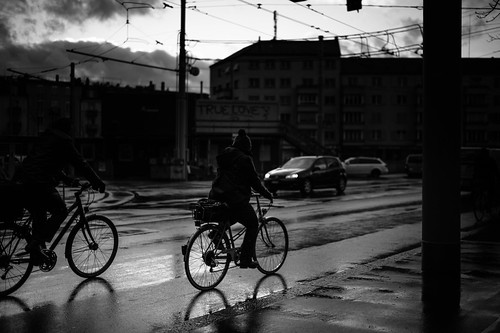The other day, biking home from a late night show downtown, I was able to travel most of the time outside of the downtown region on a bike path. For a few blocks, the road was completely torn up and I reluctantly traveled slowly on the sidewalk. Waiting for the light at a major intersection three miles from home, I decided to reward myself with the remnants of dinner, a coconut doughnut from DD. But the car full of doodbr0s (of which at least one was a d00d-t00tsie?) behind me wasn’t having it. In a bike path section which at this section doubles as a right turn section for motor vehicles, I was expected to get out of their way.
And go where? I do not know. It’s not that I couldn’t have squeezed somewhere else, but this was my space. I got there first and I was merely waiting for the light to change. They could not bare the thought of being blocked from their next batch of beer by a guy on a twenty pound bicycle who would not bow down immediately to the mighty car and the mighty bros who wielded such power. And so they made it abundantly clear that I did not belong on the road. They honked. They yelled and cursed at me to get out their fucking way and get off the fucking road. Repeatedly. I responded but never gave them the satisfaction of turning around. After all, the road is mine too and I shouldn’t have to suffer abuse because some drunk people think my existence is an inconvenience.
It wasn’t the first time that someone tried to run me off the road or what little space is accredited to me and other bike riders. Traveling home from work one day, I had a car of young dudes nearly run me off the road. In this case, since there is no bike path on this road, I was already as far to the right as I could get, but that still wasn’t enough. They honked fiercely and I moved further and further to into parked cars, fearing for my life. Then when they got right in front of me, they vocalized their dissent at my existence. “Get the fuck out the way.”
These two incidents in combination with daily interactions with cars and vans that come just a bit too close for comfort on roads and bridges remind me that bicycle riding is not safe because, despite what the government says, roads are not made for bicycles. Sure, Augusta Ave has a bike path while Pulaski Ave doesn’t. But neither are really for bicycles. I travel down one route all the way because finding acceptable bike paths adds an extra four miles, and much of that territory despite being labeled “bike-friendly” is anything but friendly to me or my bicycle – completely ripped up roads, a bridge without traction, stretches set apart on the map but not in reality, and really, really foul stenches. Even bike paths are just afterthoughts. The roads are made for heavy, fast-moving vehicles and bicycle use and bicyclists are merely an addendum. Our existence isn’t really welcome, and I see that and recognize that.

Bicycle Race – Toby Gaulke via Flickr
I’ve already noted some parallels between how I’m treated being a cyclist for commuting purposes and how a White/Cis/Hetero/Capitalist Class/Able-Bodied/Neurotypical Supremacy culture treats marginalized and oppressed people who buck the system. But what should be noted is that the roads aren’t made for us. They may make concessions, but at the frame of convenience, they will let you know who is in charge and who does not really “belong” in the routes of power and currency.
It seems that drivers will not recognize us until we speak up and loudly. Until we take their aggression back on them. Until we mobilize. For if they only see a few of us, they can run us off the road .
And yet, we are told that we are too loud, too abrasive, too much, too wonky, too naked. Whether or not we obey rules of the road that were not made for us and do not accept us, we are demonized and pushed to the margins.
So, what to do besides give up? Because existence for many is a means of political resistance to the dominant powers. We scream and make our presence known from the margins of the road that we are here, that we are not sacrificial lambs, that we are worthy of respect, safe spaces, rights, justice. Our collective anger is justified – as is our collective joy. We rally, we network, we write our lawmakers, we push, we embody and demand space on these roads. And our “complaining” (as some are wont to call it) is an act of prophecy and justice seeking.
#SorryNotSorry if you’re worried about what the “right time” is, but my body is not on your time and not yours to negotiate. And still, I ride.


